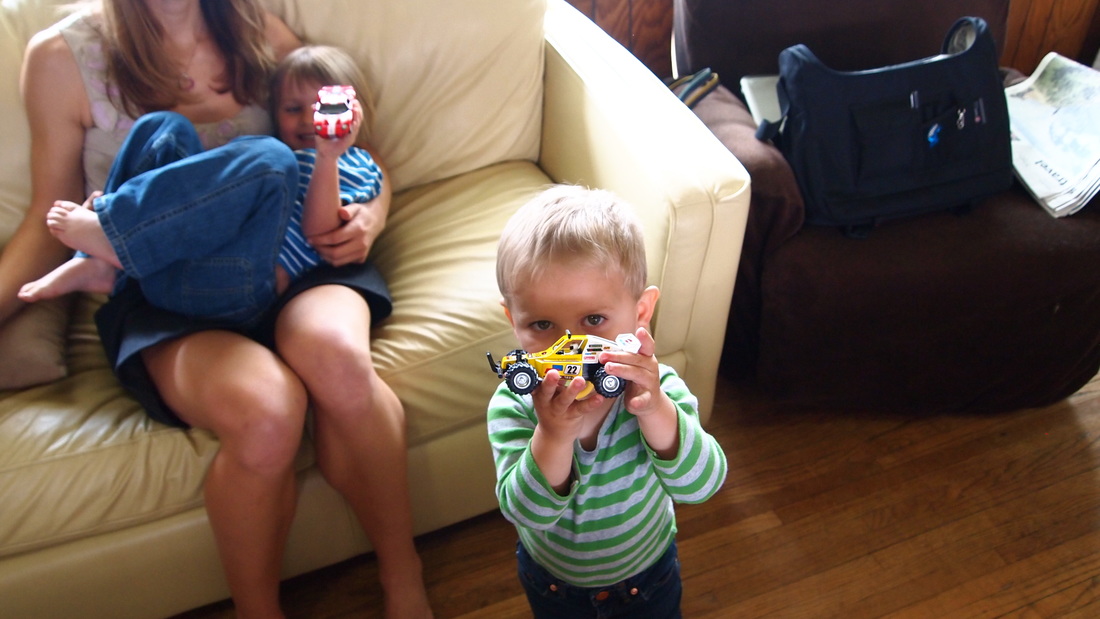|
A few months ago, I wrote that, by 1979 standards, your first-grader is probably emotionally and physically stunted. Indeed, according to education expert Louise Bates Ames, Ph.D., here are the 1979 prerequisites for 1st grade:
1. Will your child be six years, six months or older when he begins first grade and starts receiving reading instruction?
It's clear from this list that the children of yesteryear had much more independence than kids today -- many of whom have never gone anywhere on their own or ridden a bike without training wheels and full body armor. (And some of whom won't until they're twelve...)
Yet, if you've seen a kindergarten curriculum in the last few years, you probably know that the kids of yesteryear were intellectually far behind their modern-day peers. Or were they? Yes, kids today can generally count eight- to ten pennies -- they can probably also multiply, add and subtract fractions, and divide. I spent six months doing research at the Bing Nursery School. There, I met parents who bragged about how many words their preschooler could read and how quickly their child could do flashcards. But. The best way to give your child a creative, entrepreneurial mind has nothing to do with flashcards. After all, it's the digital age. Knowledge is worth less than ever, because however fast you can do flashcards... a computer can do them faster. However much you can memorize, a computer can memorize more. However well you can answer questions with one correct answer... a computer can do it more, better, and faster. So. In order to set your child up for success in the modern world, you only have to teach them one word:
Hypothesis.
In the digital age, memorizing content is basically worthless. If your child asks you a question -- perhaps, "What?" or "Why?" -- providing an answer is actually the least helpful thing you can do. Instead, ask them,
What do you think? What is your hypothesis?
This provides your child with something much more valuable than an answer. It goes way beyond new content. Instead, it teaches your child several things:
1) How to think creatively about a problem. 2) That, often, there is more than one way to figure out the answer to a question. 3) Coping and resilience skills. In the real world, you're not always going to get the right answer. Will that frustrate your child and motivate them to quit? Or will it challenge them to try again to find a solution?
So for example (to borrow from a previous post),
Child: How do I draw a dog?
If the child starts to do something "wrong," LET THEM! Figuring out what went wrong it an important part of the process -- and an important part of developing those crucial coping skills. Let them make their mistake. And then say,
Adult: Uh oh! It looks like we did something wrong. Does any part of the dog look weird? What part doesn't look right to you? How can we fix it? What should we do differently next time?
Here's another example, which I've borrowed from How iPads Kill Happiness and Creativity:
A few weeks ago, I flew to the East Coast. As I was flipping through the in-flight magazine, I noticed a page with pictures of the airline's different planes. The four-year-old in the seat next to me asked, "What's that?"
Make sure that you explicitly talk to your child about how, sometimes -- a lot of the times! -- our first hypothesis is wrong. But that's okay! Because the fun part isn't always finding the correct answer -- a lot of times, as illustrated in the previous example, it's about the process of figuring it out.
So if you are going to sit down and teach your child one word, it should be hypothesis. Because, although I just said that "content is basically worthless," hypothesis is more than a vocab word -- it's a way of thinking. It's a way of life. And it's much more likely to bring your child happiness, creativity and success than forcing them to memorize that 2+2=4 ever would.
(Like, seriously, just because a three-year-old can say that 2+2=4, you don't necessarily know if their brain is developed enough to even understand that concept, or if you've simply trained them repeat a certain phrase. Comprehension is not the same as memorization. Problem solving is not the same as stimulus-response. And your kid's never going to be better at addition than a calculator, anyway.) To really get the full effect of learning the word "hypothesis," make sure you explicitly explain to your child that their brain is like a muscle. The more you use it, the stronger it gets. Carol Dweck, a psychology professor at Stanford, has spent the last few decades researching implicit theories of intelligence. She's found that some people assume that intelligence is fixed, and there's not a lot they can do to change it. Other people have an incremental theory of intelligence. These are the people who do best in the face of risk, challenge and hardship. After all, if you think intelligence is fixed, and you do badly on a math test, that means you're bad at math, right? And there's no point in trying harder next time. But if you think intelligence can grow, you'll ask the teacher to walk you through the problems you missed so you learn, grow and do better next time.
And on that note, praising your child is a good thing -- if you focus on their effort and improvement, rather than their natural ability. This will reinforce the idea that hard work pays off. That intelligence can grow like a muscle. And that it's fun to come up with creative questions, hypotheses and experiments to answer questions and solve problems.
Oh, and one last thing: please, please, please, PLEASE don't hire your child a tutor.
0 Comments
Leave a Reply. |
About the Author

Eva is a content specialist with a passion for play, travel... and a little bit of girl power. Read more >
Want to support The Happy Talent? CLICK HERE!
Or Find me on Patreon!
What's Popular on The Happy Talent:
Trending in Dating and Relationships:
What's Popular in Science: Playfulness and Leisure Skills:
Popular in Psychology and Social Skills:
Categories
All
|




























 RSS Feed
RSS Feed